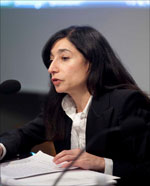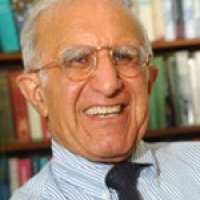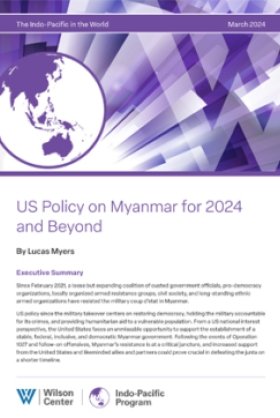Iran Primer I: Domestic Politics
Geneive Abdo, Director, Iran Program, The Century Foundation; Shaul Bakhash, Clarence J. Robinson Professor of History, George Mason University; Robin Wright, USIP-Wilson Center Distinguished Scholar
Overview
In the first in a series of meetings following the recent release of the book The Iran Primer, three of its contributing authors offered their insights on Iran's domestic politics in the year following the contested elections of June 2009 which saw Mahmoud Ahmadinejad reelected to a second, thus far contentious, term. The topics analyzed included internal politics, the opposition movement, and the current state of diplomacy with Iran.
On December 15, 2010 the Middle East Program hosted a meeting on "Iran Primer I: Domestic Politics" with Geneive Abdo, Director, Iran Program, The Century Foundation; Shaul Bakhash, Clarence J. Robinson Professor of History, George Mason University; and Robin Wright, USIP-Wilson Center Distinguished Scholar and editor of The Iran Primer. Haleh Esfandiari, Director of the Middle East Program at the Woodrow Wilson Center, moderated the event.
Bakhash began by discussing this week's abrupt dismissal of Foreign Minister Manouchehr Mottaki by President Ahmadinejad, saying that it is illustrative of Ahmadinejad's brash style and emerging clout. The sudden dismissal was surprising since the selection of the foreign minister has been in practice the prerogative of the Supreme leader, and while we do not know if Ahmadinejad secured Khamenei's permission before firing Mottaki, we do know Ahmadinejad and Mottaki have been at loggerheads; and that Khamenei would not have approved of the manner of Mottaki's dismissal. Bakhash used this example to introduce two broad points: 1) the office of the president has emerged as a power center in the last 20 years; and 2) Ahmadinejad's exercise of power is different from that of his predecessors and may hint at a shift in the balance of power between the president and the supreme leader. Bakhash concluded that there are repercussions to Ahmadinejad's boldness in his foreign policy, but they are tempered by his approval of many of Ahmadinejad's policies and his inability to curb the president, who has tapped into Khamenei's power base to create one of his own.
 Abdo focused on the diversity of the opposition Green Movement in Iran. She noted that there is a tendency to narrowly define the opposition as street protesters, but it is much broader than that, as witnessed in the aftermath of the elections last year. The opposition is more of a social movement than a revolutionary movement, she said. Its goal is to advocate fundamental change in the existing order while working within the current constitutional framework, yet the regime fears that its ultimate objective is revolution. Abdo described the movement as having layers: youth who use their social networking skills to help disseminate information, labor which has engaged in strikes, and clerics who feel that the regime went too far after the disputed 2009 presidential election.
Abdo focused on the diversity of the opposition Green Movement in Iran. She noted that there is a tendency to narrowly define the opposition as street protesters, but it is much broader than that, as witnessed in the aftermath of the elections last year. The opposition is more of a social movement than a revolutionary movement, she said. Its goal is to advocate fundamental change in the existing order while working within the current constitutional framework, yet the regime fears that its ultimate objective is revolution. Abdo described the movement as having layers: youth who use their social networking skills to help disseminate information, labor which has engaged in strikes, and clerics who feel that the regime went too far after the disputed 2009 presidential election.
Wright discussed new diplomatic efforts to engage Iran on its controversial nuclear program. On Dec. 6 and 7, six major powers—the United States, Britain, China, France, Russia and Germany—met with Iranian officials in Geneva. But the only major achievement was an agreement to hold a second round of talks in late January. And Iran almost immediately said it would not discuss uranium enrichment, undermining prospects for future success. U.S. representatives also did not meet separately with their Iranian counterparts on the sidelines of the Geneva talks, as Washington had hoped. As a result, there is growing skepticism about Tehran's ability or willingness to engage in serious rapprochement. Iran is an increasingly unpredictable negotiating partner, especially as the nuclear issue has become wrapped up in domestic politics. The current diplomatic framework is not encouraging, Wright noted, because it is open-ended and allows Iran to play "diplomatic dodge-ball" while continuing to work on uranium enrichment. She explained that the military option is still on the table, the Obama administration wants to avoid a third war in the region. The most effective U.S. tactic so far has been targeted financial sanctions that have made it far more difficult for Iran to do business with the outside world.
By Mona Youssef, Middle East Program
Haleh Esfandiari, Middle East Program
Documents & Downloads
Speakers
Hosted By

Middle East Program
The Wilson Center’s Middle East Program serves as a crucial resource for the policymaking community and beyond, providing analyses and research that helps inform US foreign policymaking, stimulates public debate, and expands knowledge about issues in the wider Middle East and North Africa (MENA) region. Read more
Thank you for your interest in this event. Please send any feedback or questions to our Events staff.











